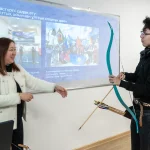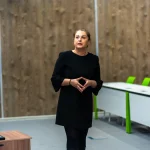OK1. The ability to understand the driving forces and patterns of the historical process, the place of a person in the historical process and the ability to understand philosophy as a methodology of human activity, readiness for self-knowledge, initiative, development of cultural wealth as a factor in harmonizing personal and interpersonal relationships
OK2. The ability to form and develop skills and competencies in the field of organization, planning and production management, the ability to apply the acquired knowledge to comprehend the surrounding environmental reality, the ability to summarize, analyze, predict when setting goals in the professional field and choose ways to achieve them using the scientific research methodology
OK3. Ability for written and oral communication in the state language and the language of interethnic communication, as well as in a foreign (English) language. The ability to use foreign sources of information, to have communication skills, to public speaking, argumentation, conducting discussions and polemics in a foreign language
OK4. The ability to be competent in the choice of ICT and mathematical modeling methods for solving specific engineering problems, the ability to be ready to identify the natural science essence of problems arising in the process of professional activity, and the ability to attract the appropriate mathematical apparatus to solve it
PC1. The ability to understand modern standards, regulatory framework, the basics of economic knowledge, scientific ideas about project management and technological entrepreneurship.
PC2. The ability to professionally use modern computer equipment, network components, computer programs and complex computing systems (in accordance with the objectives of the program), as well as use the safety rules, industrial sanitation, fire safety and labor protection standards.
PC3. The ability to possess the skills of using and applying algorithms, data structures and modern methods for creating (developing) and further supporting various software systems for analyzing big data.
PC4. The ability to use the basic principles and methods for solving managerial problems, the ability to execute project documentation in a software environment using computer graphics for various types of projects.
PC5. The ability to be competent in the choice of mathematical modeling methods for solving specific applied problems in big data analysis, including the willingness to identify the natural science essence of problems arising in the process of professional activity, and the ability to attract the appropriate mathematical apparatus to solve it.
PC6. The ability to design the architectures of components of information systems, including the human-machine interface of hardware and software systems, and to select operating systems and information protection methods.
PC7. Ability to develop information and information system software based on modern development methods and tools.
PC8. Ability to collect, process and analyze data using the organization’s methodological and technological infrastructure.
PC9. The ability to manage the life cycle stages of the methodological and technological infrastructure of software development, data analysis, design of IT infrastructure in various organizations.
PC10. The ability to use modern programming environments for the design and implementation of software solutions and databases for information and communication technologies.
PС11. The ability to apply the elements of probability theory and mathematical statistics that underlie the models and methods of data science, to choose the right methods of data analysis, machine learning and artificial intelligence to solve practical problems.
PС12. The ability to develop and implement safe and testable solutions based on new methods and technologies for information security, used when working with information and communication technologies.





